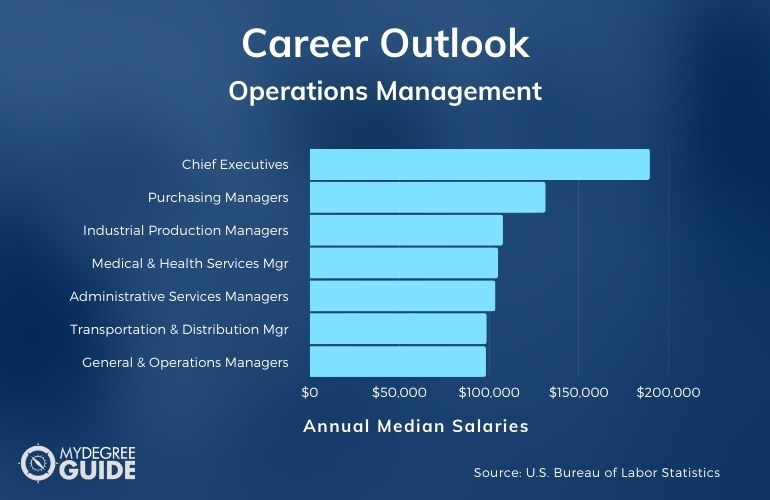Current and aspiring leaders alike can benefit from a masters in operations management. This degree program helps students become more ethical, logical, and efficient managers and executives in organizations of every size, structure, and industry.

While earning an operations management master’s degree, you’ll learn about all the aspects of overseeing a business, from finance and staffing to logistics. The knowledge and skills you gain may help you advance within your organization or transition into a management role with a new company.
Editorial Listing ShortCode:
Graduating from an accredited online operation management master’s program could be a strategic next step in your professional journey.
Online Masters in Operations Management Programs

Operations management graduate programs are designed to provide students with the skills necessary to effectively manage a business, nonprofit, or other organization. They are well suited to both seasoned professionals and recent college graduates.
While earning your operations management degree, you will study a broad spectrum of subjects to ensure that you understand the various aspects of operations management. Possible course topics include:
- Ethics
- Supply chains
- Quality control
- Employee management
- Strategic thinking
- Decision-making
- Problem-solving
- Finance
Some programs culminate with a capstoneA project or thesis that allow you to thoroughly research a subject of interest under the guidance of a faculty mentor. Others include practicums or internships that give you real-world experience in the field.
Editorial Listing ShortCode:
Students who want to pursue careers in a particular area of management may have the option to select a concentration. Colleges might offer certificates and specializations in areas such as global business, healthcare, construction, human resources, and technology.
After earning your degree, you may find that there are many prospective employers looking for job candidates with your knowledge and expertise. The types of organizations that hire professionals with operations management master’s degrees include:
- Healthcare facilities
- Government agencies
- Colleges, universities, and schools
- Banks and other financial institutions
- Manufacturing businesses
- Logistics companies
Graduates may go on to work in leadership roles where they’re responsible for a single department or an entire organization. Possible positions include operations managers, medical managers, chief operating executives, and purchasing managers.
Other professionals work as analysts who don’t directly supervise operations but rather offer insights and recommendations. Because an operations management master’s program is often interdisciplinary, you may be qualified to work as a budget, operations, or management analyst.
Operations Management Careers & Salaries

A master’s degree in operations management is a beneficial credential for a number of career paths. Graduates of these programs often go on to work as operations, human resources, fundraising, and finance managers.
Others become analysts who specialize in compiling and drawing conclusions from data to help improve operational processes for their employers.
According to the Bureau of Labor Statistics, these are the median wages for some careers related to operations management.
| Careers | Annual Median Salaries |
| Chief Executives | $189,520 |
| Purchasing Managers | $131,350 |
| Industrial Production Managers | $107,560 |
| Medical and Health Services Managers | $104,830 |
| Administrative Services Managers | $103,330 |
| Transportation, Storage, and Distribution Managers | $98,560 |
| General and Operations Managers | $98,100 |
| Project Management Specialists | $95,370 |
| Management Analysts | $95,290 |
| Operations Research Analysts | $85,720 |
These kinds of management and analyst positions are vital in multiple fields, including education, hospitality, and distribution. The skills developed during an operations management master’s program can help you to better guide, assess, and oversee all types of organizations.
Editorial Listing ShortCode:
Many management careers are projected to experience accelerated growth over the next ten years. For example, according to the Bureau of Labor Statistics, the growth rates for medical and health services managers are especially fast at 28%. This is much faster than the average rate for all occupations.
Master of Operations Management Curriculum & Courses

A graduate program in operations management is designed to prepare students to serve in leadership roles in many kinds of organizations. These are common foundational courses that students may take:
- Project Management: In this course, you’ll learn about project life cycles, scheduling, and the techniques required to implement and oversee a project plan.
- Risk Analysis: This class provides students with knowledge of the tools and strategies used to evaluate economic and safety risks.
- Supply Chain Management: Students taking this course explore the process of transporting materials from one location to another, including storage, procurement, and distribution.
- Quality and Productivity: Quality control is a vital element of business operations, and this class introduces you to the processes that allow managers to consistently meet quality standards.
- Managing People and Organizations: This course introduces you to key management concepts, such as organizational communication, human resources, and decision-making.
- Marketing Management: The focus of this course is the approach to retaining and growing a loyal customer base within a select target market.
- Financial Management: This class provides students with an overview of financial management and centers on subjects such as trading stocks, bonds, and financial leverage.
- Strategy: During this course, you can develop an understanding of organizational strategy, with an emphasis on information technology, legal considerations, and global operations.
- Management Science: In this class, you’ll learn how to use quantitative techniques, including simulations and optimization, to enhance your decision-making processes.
- Ethics and Leadership: The primary subject in this course is professional ethics and how ethical behavior contributes to more successful business operations.
Depending on your interests and the program design, you may also have the option to take electives or complete certificates in areas related to your career goals, such as healthcare leadership and supply chain management.
How to Choose an Online Masters in Operations Management Program

When deciding where to complete your operations management master’s degree, it’s beneficial to take a holistic view of the program. If you’re wanting to narrow down your options, it could be helpful to consider these key factors:
- Format. An online master’s in operations management program may offer asynchronous courses that you can complete at the time that best suits your schedule. Others have synchronous courses that require you to attend class at a specific time.
- Focus. If you have a particular career path in mind, you can look for a program that includes electives or concentrations that align with your passions. For example, some programs offer specializations in project management, entrepreneurship, or engineering management.
- Cost. It’s beneficial to research programs that are not only within your budget but also offer opportunities for financial aid or scholarships. You might consider whether your residential status affects the cost of attending a prospective school.
- Accreditation. It’s helpful to confirm that the university you plan to attend has met the standards of a regional accrediting body. This helps ensure that you receive a high-quality education.
- Support services. If you want to find a program that may support you throughout your academic journey, you can look for support services such as mentoring, internships, and career placements.
- Faculty. During a master’s program, faculty members will guide your research. You can determine whether the faculty at a potential college have qualifications and experience that are relevant to your interests.
Much of this information is likely available through a school’s website, but admissions counselors, financial aid specialists, and alumni networks are also valuable resources.
Admissions Requirements

Schools typically have the following admissions requirements for masters programs:
- Test scores. Some schools, not all, require graduate students to submit minimum GRE or GMAT scores.
- Transcripts. Your official transcripts reflect your past coursework and GPA.
- Recommendations. Instructors and supervisors who are familiar with your skills can explain why you are a good fit for a program in a reference letter.
- Resume. A resumé or CV outlines your professional, academic, and volunteer experience.
- Essay. Your personal statement is an opportunity to describe your accomplishments and goals.
Other possible criteria include submitting an application, paying a fee, or completing an interview.
Accreditation

With so many options available, regional accreditation is an especially useful indicator of a graduate school’s quality.
To become accredited, colleges must undergo a lengthy assessment process. Only institutions that have met the very high standards of regional accrediting bodies are approved. As a result, employers often prefer job candidates with degrees from regionally accredited schools.
Editorial Listing ShortCode:
Accreditation is also critical if you choose to change programs before graduating or want to pursue a doctoral degree. It’s typically easier to transfer credits from a regionally accredited college or university.
Operations Management Licensure and Certifications

Licensure generally isn’t a requirement for a career in operations management, but a professional certification may strengthen your resumé and allow you to develop new skills.
Popular certification options in the field include:
- Certified in Planning and Inventory Management: This certification reflects knowledge in supply, demand, and distribution.
- Certified Supply Chain Professional: Professionals with this certification understand technology, strategies, and concepts of supply chain management.
- Certified in Logistics, Transportation, and Distribution: Earning this certification requires advanced skills in streamlining logistics, transportation, and distribution.
Obtaining a certification usually involves passing a comprehensive exam covering subject-related material.
Financial Aid and Scholarships

Many graduate students seek financial support to achieve their academic goals. If you’re interested in seeking financial assistance, there are many opportunities for aid.
A common first step is to file a FAFSA, an application that the federal government uses to determine whether you’re eligible for student loans, grants, or work studies. Your state may also offer separate grant programs, often depending on whether you’re attending an in-state school.
In addition to loans and grants, you may also qualify for scholarship opportunities. You can use an online database or speak to a financial aid specialist to find scholarship programs that are designed for your major or your personal circumstances.
If you’re currently working, your employer may offer tuition reimbursement or assistance. Many organizations offer aid as a benefit for employees who want to continue their professional development.
What Is an Operations Management Masters Degree?

An online masters in operations management degree is a graduate program that helps prepare students to lead organizations in a range of industries. It typically focuses on skills such as leadership, ethics, resource allocation, and strategy.
Students in operations management masters programs learn how to analyze operational efficiency and performance, with an emphasis on production, distribution, and logistics. Depending on the focus of the program, you may also learn about supply chains, finance, contracts, and marketing. Some programs require the completion of a thesis or capstone project involving extensive research.
What Can You Do with a Master Degree in Operations Management?

Many graduates of operations management masters degree programs plan to become general or operations managers, but this degree is also useful for professionals in other roles.
An operations management degree is beneficial for managers in finance, human resources, and healthcare. The skills you can develop during this type of program are also an asset to management analysts and operations research analysts.
According to the Bureau of Labor Statistics, many of these positions pay above average salaries. Completing a masters could also help you increase your earning potential and expand your career opportunities.
How Long Does It Take to Get an Operations Management Masters Degree Online?

The amount of time it takes to complete a masters degree depends on your enrollment status and the program structure.
Most operations management master’s degree programs require between 30 and 40 credit hours. A full-time student can generally complete their coursework within 2 years. Some accelerated programs operate on condensed schedules and include summer classes to allow students to graduate within 1 year.
Editorial Listing ShortCode:
If the degree program includes a thesis or internship, the timeframe may be extended. Students who enroll on a part-time basis due to other obligations, such as childcare or work, may need longer to finish their degrees.
What’s the Difference Between a Masters Degree in Operations Management vs. Supply Chain Management?
Supply chain managers and operations managers sometimes have overlapping responsibilities, but master’s degree programs in these areas differ in significant ways.
| Master’s in Operations Management | Master’s in Supply Chain Management |
|
|
If you’re especially interested in staffing, budgeting, and production, a degree in operations management may be a strategic fit.
What’s the Difference Between an MBA vs. MS in Operations Management?
When deciding what degree to pursue, it’s helpful to consider the differences between a Master of Business Administration (MBA) and a Master of Science (MS) in Operations Management.
| MBA in Operations Management | MS in Operations Management |
|
|
Students who know that they want to work in operations management or related roles are often best served by obtaining an MS in Operations Management.
Is a Masters in Operations Management Worth It?

Yes, a masters in operations management is worth it for many students. Businesses in every industry, from healthcare to finance and government, require experienced and knowledgeable operations management professionals.
Graduates of these programs are qualified to work for a wide pool of employers. According to the Bureau of Labor Statistics, many careers related to operations management will also have faster than average growth over the next ten years.
Editorial Listing ShortCode:
For example, operations research analysts (23% job growth), management analysts (11%), and general and operations managers (7%) are all projected to have faster than average growth.
Universities Offering Online Master in Operations Management Degree Programs
Methodology: The following school list is in alphabetical order. To be included, a college or university must be regionally accredited and offer degree programs online or in a hybrid format.

Clarkson University offers a Master of Science in Engineering Management online. The curriculum was shaped by Clarkson’s industry partners. Potential courses include Leading and Managing Organizations, Negotiations and Relationship Management, and Operations Strategy and International Competitiveness. To graduate, students must apply their newfound knowledge in the completion of a capstone project.
Clarkson University is accredited by the Middle States Commission on Higher Education.

Johnson & Wales University offers an online Master of Science in Operations and Project Management. Courses are 8 weeks long, and the program can typically be completed in 2 years. The student-to-faculty ratio is just 15-to-1. Potential courses in the curriculum include Effective Leadership, Global Strategic Sourcing, and Designing and Managing Supply Chains.
JWU is accredited by the New England Commission of Higher Education.

Kettering University offers a Master of Science in Operations Management. This flexible program is 100% online and can potentially be finished in just 18 months. Students may also choose to earn an embedded certificate in Supply Chain, Management and Leadership, Lean Principles in Healthcare, Operations Management, or Global Leadership.
Kettering University is accredited by the Higher Learning Commission.

South Dakota State University offers an MS in Operations Management both online and at the Brookings main campus. The curriculum is designed to teach students how to build businesses that are both effective and efficient. Potential courses include Management and Leadership in Technical Organizations, Operations Management and Research, and Project Management.
SDSU is accredited by the Higher Learning Commission.

An MS in Operations Management can be earned online at the University of Alabama. The program requires the completion of 30 credit hours and is designed to allow students to work full-time while earning their degree. Students typically enroll part-time, taking two classes each semester, and finish in 18 to 24 months.
The University of Alabama is accredited by the Southern Association of Colleges and Schools Commission on Colleges.

The University of Arkansas offers a Master of Science in Operations Management. The program requires the completion of 30 credit hours and may be finished 100% online. Courses are also available in-person at three different campus locations. There are five 8 week sessions every year. It typically takes 1.5 to 2 years to graduate.
The U of A is accredited by the Higher Learning Commission.

The University of Denver offers a Master of Arts in Arts and Culture Management with a concentration in Mission-Driven Operations and Management that focuses on nonprofits. Courses are 10 weeks long and available in asynchronous and hybrid online formats.
Potential courses include Graduate Social Research Methods, Leading Nonprofit Financial Health, and Operational Strategy and Structures. The program can potentially be completed in 18 months.
The University of Denver is accredited by the Higher Learning Commission.

At the University of Wisconsin – Stout, an MS in Operations and Supply Chain Management can be earned online or on campus. Concentrations are available in SAP ERP Business Analytics, Quality Management, Project Management, Occupational Safety and Industry Hygiene, and more.
The University of Wisconsin-Stout is accredited by the Higher Learning Commission.

Utica University offers a Master of Science in Cybersecurity Operations Management. The program can be completed 100% online, with no residency requirements. The program is designed to prepare for CompTIA+ and Security+ certifications and no prior technical experience is required to apply. The completion of 30 credit hours is required to graduate, which can typically be done in 2 years.
Utica University is accredited by the Middle States Commission on Higher Education.

Webster University offers an MS in Space Systems Operations Management. The program has two emphasis areas to choose from: Acquisitions and Program Management or Engineering and Technical Management. The curriculum consists of 39 credit hours of courses such as Practical Research in Space Operations, Space Systems Engineering, and Space Environment.
Webster University is accredited by the Higher Learning Commission.
Getting Your Masters in Operations Management Online

Earning a master’s program in operations management online can help you grow your professional qualifications.
Whether you want to begin your career with an advanced credential in hand or you’re a working professional who wants to take on additional responsibilities, a masters in operations management could be beneficial.
This degree centers around professional ethics, sound leadership, and a deep understanding of organizational behavior. During your master’s program, you can learn how to properly evaluate, improve, and maintain successful operations for your employer.
If you’re interested in developing your expertise in this growing field, you could begin by researching accredited schools that offer online masters in operations management programs.

